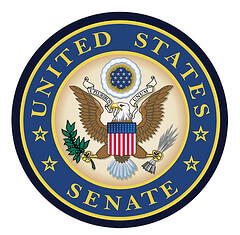
The following are some of the Senate immigration bills which were introduced in 2025:
- (Coming Soon)
Senators also sponsor private bills for constituents in sympathetic cases where there are no remedies under the immigration laws. Senator Feinstein (D-CA) has introduced a number of private bills on behalf of our clients. The first one resulted in a green card for Guy Taylor, a Canadian who was orphaned at the age of 16. Another one was for Mr. and Mrs. Cabrera. Fortunately, our law firm was able to obtain permanent residence on their behalf through cancellation of removal.
Our website contains Attorney Shusterman’s testimony before the Senate Immigration Subcommittee.
Client Reviews

Carl Shusterman is Simply the Best
“I am a Los Angeles-based news reporter, who hired Carl and his team of attorneys to help me acquire permanent residency in the United States. I was dreading the arduous and bureaucratic process, but Carl and his staff were so professional and efficient, they helped the procedure go very smoothly.”
- Ann S., Santa Clarita, California
Read More Reviews
Zoom Consultations Available!
Senate Immigration Hearing – Judiciary Committee
Flatlining Care: Why Immigrants Are Crucial to Bolstering Our Health Care Workforce (9-14-22)
Some Senate Immigration Bills Introduced in 2022
RELIEF Act of 2022
This bill revises provisions related to family- and employment-based visas.
The bill (1) increases the per-country cap on family-based immigrant visas from 7% of the total number of such visas available that year to 15%, (2) eliminates the 7% cap for employment-based immigrant visas, and (3) removes an offset that reduced the number of visas for individuals from China. The annual cap for visas for the unmarried children of citizens is increased, and the formula for calculating the cap for the unmarried children of residents is revised.
The bill also establishes transition rules for employment-based visas from FY2022-FY2024, by reserving a percentage of EB-2 (workers with advanced degrees or exceptional ability), EB-3 (skilled and other workers), and EB-5 (investors) visas for individuals not from the two countries with the largest number of recipients of such visas. Of the unreserved visas, not more than 85% shall be allotted to immigrants from any single country.
The Department of State shall increase allocations of family- and employment-based visas by the number of beneficiaries of such applications filed before this bill’s enactment, to be allocated FY2022-FY2026 to beneficiaries of applications filed before this bill’s enactment who have not yet received a visa.
The minor children and spouses of permanent residents and those accompanying a qualified alien shall be treated as an immediate relative for immigration purposes. Whether an alien qualifies as a minor shall be determined according to the alien’s age at the time a relevant petition is filed.
Renewing Immigration Provisions of the Immigration Act of 1929
This bill would
* Amend the existing Registry statute by moving the eligibility cutoff date so that an immigrant may qualify for lawful permanent resident status if they have been in the U.S. for at least seven years before filing an application under Registry.
* Preempt the need for further congressional action by making the eligibility cutoff rolling, instead of tying it to a specific date, as it is now.
Keep STEM Talent Act of 2022
This bill exempts certain aliens with advanced degrees in a science, technology, engineering, or mathematics (STEM) field from direct limitations on the number of immigrant visas granted per year. Specifically, the alien must (1) have earned a master’s level or higher degree in certain STEM fields while in the United States attending an accredited higher education institution, (2) be employed (or have a job offer) in a field related to the degree and earn at least the median wage for that occupation, and (3) meet certain labor certification requirements.
The bill also allows an alien seeking a nonimmigrant F-1 (student) visa to obtain an advanced STEM degree to have dual intent. Specifically, such an alien may obtain the nonimmigrant visa or change nonimmigrant status even if the alien intends to seek lawful permanent resident status. (Generally, an alien may be denied a nonimmigrant visa if the alien actually intends to seek immigrant status, unless dual intent is allowed for that type of visa.)
EAGLE Act of 2022
This bill modifies requirements related to employment-based visas and addresses related issues.
The bill increases the per-country cap on family-based immigrant visas from 7% of the total number of such visas available that year to 15% and eliminates the per-country cap for employment-based immigrant visas.
The bill establishes transition rules for employment-based visas such as (1) reserving a percentage of EB-2 (workers with advanced degrees or exceptional ability) and EB-3 (skilled and other workers) visas for individuals not from the two countries with the largest number of recipients of such visas, and (2) allotting a number of visas for professional nurses and physical therapists.
The bill imposes additional requirements on an employer seeking an H-1B visa, such as prohibiting (1) an employer from advertising that a position is only open to H-1B applicants or that H-1B applicants are preferred, and (2) certain employers from having more than half of their employees as nonimmigrant visa workers.
The Department of Labor shall create a publicly available website where an employer seeking an H-1B visa must post certain information about the open position.
The bill also expands Labor’s authority to review and investigate H-1B applications for fraud or misrepresentations.
The bill also allows certain aliens to obtain lawful permanent resident status if the alien (1) is in the United States as a nonimmigrant, (2) has an approved immigrant visa petition, and (3) has waited at least two years for a visa.
H–1B and L–1 Visa Reform Act of 2022
This bill modifies requirements related to H-1B (specialty occupation) and L-1 (intracompany transfers) nonimmigrant visas and contains related provisions.
Provisions relating to H-1B visas include
* requiring the Department of Labor to review petitions for indicators of fraud or misrepresentation of material fact;
* requiring the Department of Homeland Security (DHS) to prioritize certain petitions, with top priority for workers with advanced degrees in science, technology, or engineering;
* requiring an H-1B worker to possess at minimum a bachelor’s degree to meet specialty occupation requirements (currently, relevant experience may be used instead); and
*prohibiting an alien classifiable in certain H-1B categories from obtaining a B-1 (temporary business visitor) visa.
Provisions relating to L-1 visas include
* requiring a waiver from Labor for an L-1 worker to be primarily stationed with an employer other than the petitioning employer;
* prohibiting an alien from receiving an L-1 visa to open or be employed in a new office if the alien has received two or more such visas in the last two years; and
* increasing the L-1 worker minimum wage to the highest of certain amounts, such as the median wage for the worker’s occupational classification in the area of employment (currently, an L-1 worker must be paid at least the higher of the federal or state minimum wage).
In regards to both visas, the bill (1) expands the authority of DHS and Labor to take various enforcement actions, and (2) directs DHS to conduct annual audits of a certain percentage of employers.
SENATE IMMIGRATION LEGISLATION – ADDITIONAL RESOURCES
- A Compromise on Immigration Is Possible. This Bill Could Make It Happen. (10-28-22)
- What Happened To The Bills On Employment-Based Immigration? (8-22-22)
- Immigration Experts on Congressional Amendments and Senate Floor Immigration Debate (2-15-18)
- Advocacy Materials Related to 2018 Senate Immigration Floor Debate (2-14-18)
- California Senate Passes Historic Dignity Not Detention Act (6-01-2016)








